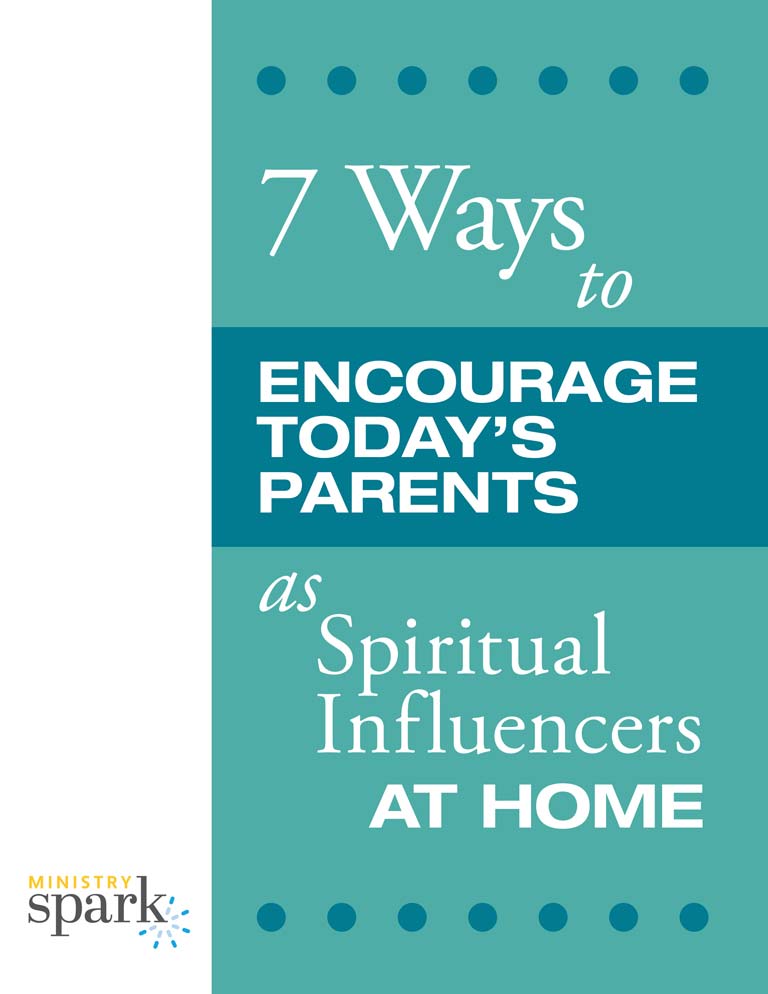Editor’s Note: This article was transcribed from our webinar: Our Role in the Faith Formation of Children: Parents and Families. It has been edited for content and length. Watch the full webinar here. You can also download the free Faith Formation guide here.
“My name is ______________. And I am the chosen and adopted child of the Most High King. I am heir to an eternal inheritance waiting for me in heaven. I have been bought and completely paid for by the perfect sacrifice of Christ’s own blood, and I have been sealed throughout all eternity by God’s Holy Spirit. Don’t mess with me!”
Dr. Michelle Anthony, Spiritual Parenting
Making Togetherness a Priority in Faith Formation
Courtney Wilson:
Let’s start with that idea of making togetherness a priority in faith formation. For a lot of parents, it’s easy to continue to run the way that we run, right? We take our kids to so many activities to help them be successful—it feels like we’re actively serving our family.
But sometimes promoting togetherness is hard because we aren’t quite sure how to do it. It feels a little more passive and less active. And parents want to be the best we can be—I know I did and still do.
I remember holding my oldest—who is now 22—and driving to his child dedication. He was itty bitty at about 16 days old. But, of course, you know as the children’s pastor, I’m dedicating him immediately. And I remember crying on the way to church. And I turned to my husband and said, “I’m a children’s pastor. I have a degree in this, and I don’t know how to live this out. I’m not sure I know how to do this.”
And my husband looked at me and he said, “You know, I’m not sure either, but we’re going to figure it out.”
A Rich Inheritance
So we walked into a room of people who knew us and loved us in a church community, a rich inheritance of people who said, we’re going to do this with you, and we’re here for you. And that is what I think has helped us have the permission to slow down and to pursue more of those togetherness type things and to let go of a lot of those performance-based opportunities.
My kids have had a lot of those opportunities. They’ve done well in sports. But I think the places our kids have really excelled is because of what we’ve taught them in those moments of togetherness. Sometimes families don’t know how to do that. So we, as churches, have to model that for them. We have to give them the reasons we have along with the resources to be able to do these things.
It feels more active to be driving around than sitting around a dinner table. We have to give them ways to feel successful and ways to feel active in those moments.
The togetherness piece is key.
And as children’s pastors and children’s ministry leaders, we need to help encourage those moments and help parents not over plan and over program. But remembering the places where we really bring families together is really important.

Ready to help parents create an environment for spiritual growth?

Ready to help parents create an environment for spiritual growth?

Ready to help parents create an environment for spiritual growth?
Courtney Weaver:
I love what you said there. The everyday moments are important. I have a four-year-old and a one-year-old, so we’re very intentional that during the week we play with them, even if it’s not every day. If we’re on our playground, we’re swinging, we’re climbing, we’re laughing. If we’re up in the playroom, we’re playing store, and we’re shopping.
I think sometimes we, as parents, overthink it. We think we need to schedule every minute or buy a devotion book or prepare some insightful thought. And there is a place for that.
But some of the best conversations I’ve had with my kids are in those everyday moments where something happens. Whether it’s a chance to improve a learning skill or a moment to recognize how Jesus has been really good to us.
Sometimes, as parents, we overthink how to talk about Jesus in those moments, when it can be so natural. We don’t have to pretend it’s anything that it’s not, and we don’t have to be theologians.
Children’s Pastors, you do what you can do and let God and His Holy Spirit do what He can only do.
Courtney Wilson
Courtney Wilson:
I know one way I think we have been successful at really getting this into the conversation in our homes is that it has come from upfront in the church. Our senior pastor is huge on asking our congregation how are you making passionate disciples? We really don’t want to fail here.
Our church mission statement is making passionate disciples of Jesus Christ for belonging, growing, serving, and reaching. That is also the mission statement of our children’s ministry and the mission statement of our student ministry. It’s our mission all the way across the board—we don’t have a different mission statement for each area of ministry. That’s what we do as a church. We make passionate disciples of Jesus Christ.
So, we talk about that all the time, and we tell parents from the pulpit that it’s part of their job too. They are making passionate disciples of Jesus Christ who are belonging, grow, serving, and reaching.
We’ll show videos from the stage in the services of families reading the Bible together. We have one Bible reading plan that goes throughout our entire church too. And it’s really important for us to feature parents and families doing these things together well and sharing that from the stage.
Keep Up the Good Work: Walk with Parents in Faith Formation
Sometimes, as children’s pastors, it can feel like we’re pushing big rocks up a hill. But it’s important that we continue to resource our families and trust that, at some point, they will grab onto some of those things.
We use Wonder Ink as our children’s ministry curriculum. Each month we hand out these flyers to our parents with all the lessons that we’re learning in this unit, the memory verses, three questions they can talk through with their kids, etc. And along with this we give them refrigerator magnets to hold them.
My family uses this flyer in the car, but a lot of people we know put this like on the refrigerator. And our children’s ministry puts more resources online. So we say, for more conversations and activities, check out kids our website. There are videos and activities and worship videos online too.
There are a lot of options, but we suggest that parents focus on the faith conversation—most parents can ask three questions, right?! They can take a few minutes in the car or at home to have some together time with these questions.

Byron Ragains:
The number one thing I remember growing up as a pastor’s kid is going on Sunday drives with my parents. I’m 60-something now, and every Sunday after we had eaten something from the crockpot—just about the time the Lakers and the Celtics would come on—my dad would say, “it’s time for our drive.” And while everybody else was watching the game or playing baseball, basketball, football, hockey, or whatever—I was in the car with my mother and father and many times embarrassed.
We would go for about an hour drive. My dad would do his best to get lost, but we’d always have enough time to get back for Sunday evening service.
My mom and dad are both in heaven, now and I long for those days again. It’s amazing what you recall and why those drives were so faith-shaping in my life. Not only was my father my pastor who baptized me, but he was also the father who, on those Sunday drives as we were together, began to disciple me and ask me questions about God.
Be Together
So, for young families, I want to encourage you to get in the car and just be together.
Secondly, we’re coming out of Covid, right? Let’s remember that we have done life and ministry outside of six feet. Faith formation happens together.
My grandson lives right down the street, and this is convicting me that I need to be with him more. I understand that the togetherness we’re talking about as far as faith formation is the priority of parents. But what if we expand that to aunts, uncles, and grandparents? I know there’s something beautiful about that.
Courtney Weaver:
If you were to look at my family culture, my mom watches my kids during the week. We’re really close to my family, and there’s not a week that goes by that we don’t see my grandparents.
I know it’s not true for everyone, but my children are privileged to get connection with their parents, their grandparents (on both sides), their great-grandparents, and aunts and uncles.
And I think what’s interesting is it doesn’t even have to stick to relatives. We have church family, and I have friends outside of that who we connect with and have those together moments with.
Again, it’s in those everyday life moments that we can connect with one another.
Faith Formation: What We’re Giving Away
But I think one of the biggest things that scares parents is feeling like we don’t know how to do this. But the fact is, you can’t give away things that you don’t possess. So if you don’t walk with Jesus, you cannot give away Jesus.
If you don’t lean into the Holy Spirit, then you can’t reflect the love and the joy and the patience in all the things that are messy and hard—things that we can’t do within ourselves. Those are things that you cannot give away because within ourselves we can’t do that.
We’ll get to this a little bit later when we talk about living out our faith, but it all ties together. Sometimes I focus too much on what it is I can do for my kids. When, in reality, we should be asking, how can I be with my kids?
And in that being with my kids, how can I then show them the Jesus that radically wrecked my life? I think we overcomplicate it with like more stuff, but we don’t need to do that.
Courtney Wilson:
There are a few things there. First of all, I did not come from a household of faith. So when you guys talk about this heritage of faith, I don’t have that. I’m not that parent. And so, there are a lot of our parents who don’t have that, and they’re a little scared of it. It’s scary to then try to do something that you’ve never seen happen before.
Anytime we have parenting workshops and things like that at church, we’ll have awesome, Christ-following parents come up to us afterward and they’re like, “My parents never did this stuff with me. I don’t know how to do this.” And we’ve realized that we must keep modeling it and giving them the desire for that.
But that’s also where the faith community comes in. Paul calls the church God’s holy people, a rich inheritance. So, our kids have a rich inheritance in the church. We are that rich inheritance.
Even if they, the parents, don’t know how to do this, we should be here with them. The whole church—together.
The other thing I say all the time is that we are not human doings—we are human beings. And we can help our parents know that they are not a human doing, they are a human being. Promote being with Jesus, being with family, being together—there is something beautiful in that. And it should be somewhat innate in us, and yet we kind of run from it too.
When we can wrap our minds around that—this whole thing is about sitting with each other with Jesus in the mess and worshiping Him because He is God and He is holy—then it becomes a lot more enjoyable, with a lot less pressure, and a lot more excitement.
Courtney Weaver
Courtney Weaver:
I love that, and I agree that we need to partner with the church in faith formation. That’s what we were talking about in our last two webinars. In the first webinar focused on the church as a whole, we talked a lot about how it looks like when a child bumps into you, because it’s going to happen. And in the second webinar around children’s ministry, we talked about all of the things that children’s ministry leaders do that that connects kids with faith.
What you do as children’s ministry leaders matter so much in the lives of kids in that one-on-one relationship. It makes all the difference in the world. For those of us who have been privileged enough to have family around, how much more blessed we are to have children’s ministry leaders who are outside of our homes, who welcome us with open arms as children, and show us what Jesus looks like.
I’m overwhelmed by the sheer number of blogs and ‘how tos’ and mom influencers who are out there trying to tell me how to be a mom and what I need to do with my kids. The idea of just one more thing can be really, really overwhelming.
And when I recognize that just being in life with my kids is sufficient—especially when I’m being in life with my kids in Jesus—it really takes off a weight of me having to be perfect or fit in a box or check off all the things. And I think that could help a lot of our parents. A lot of our parents are overwhelmed with work, and they’re overwhelmed with life. They’re trying to keep food on the table. They’re trying to do all of the things and be superheroes when that’s not ever what we were asked to be.

Talk to/with Your Kids About Faith
Byron Ragains:
That really kind of walks us into this next bullet. It’s simple. Talk to your kids about faith in faith formation.
So, how would you set this up?
Courtney Wilson:
When your kids are little, you do a lot of talking to them about faith. You have a lot of positional influence. You can put your children in and take them out of their beds, and in and out of their highchairs, and in and out of the bathtub.
But with my 22-, 19-, 17- and 13-year-olds, nope, those days are gone. And I think that’s God’s grace for us, right? We can sit and talk with them about all these things and help them understand who God is.
Because if we tell them the Big God’s Story, they learn all about the Bible, they learn their theology. When they find who God is, that’s going to inform who they are, which is going to inform their beliefs, which is going to impact their behaviors.
As they continue to grow, those conversations continue to develop. There are the muddy years of middle school, and then you head into high school. But that’s where I went from talking to my kids, to talking with my kids.
Creating Rhythms
As children’s ministry leaders, if we can develop a rhythm, we can provide them with topics that they can discuss within the natural rhythms of their lives. This could be like a calendar where we give parents the topics and resources that we’re going to release at certain times of the year.
And so, we should ask ourselves: how can we resource parents to have those conversations to their kids and with their kids in age-appropriate ways?
It’s really easy to be lost in those tiny years of changing diapers and trying to do everything right. But none of us can do everything right. And yet, I have a 22-year-old who is following Jesus by the grace of God. So have the conversations and encourage parents to do the same. And then, get kids involved in volunteering together, and promote togetherness in and out of the home.
Courtney Weaver:
So awesome—I love everything you’ve said. I’ll share a few practical things I do with my young kids if that’s helpful.
Affirmations
We do affirmations, whether before bedtime or in the car. We’ll state something, and my four-year-old repeats it. It is a simple way for him to know what’s true. Something like: “I am loved. Mommy loves me. Daddy loves me. Jesus loves me. God knows me. The Holy Spirit leads me. I am a child of God. I will not fear, for God is with me and He is for me.”
Conversations
And since my kids are so young, yes, I do a lot of talking to. There are a lot of behaviors we’re still learning, but it all typically happens in together time. I do try to do some talking with as well. So, for example, I’ll ask him questions like, “Case, what do you know to be true about Jesus?” He’ll respond with something like, “Jesus loves me even when I’m mad.” And yes, He sure does.
And I think if we can let parents know how simple it really is to start introducing who God is to our kids, they wouldn’t feel so overwhelmed. It’s as simple as having them repeat after you and stating what is true about them, what God says about them. It’s as simple as opening a conversation by just repeating that truth and declaring that truth together. There isn’t a formula for faith formation. It happens in all these ways together.
Memory Verses
I also go off what you, children’s leaders, give us (parents). We have a verse for each series, so whenever it makes sense in the togetherness, I’ll say, “Hey, let’s do your memory verse. What did we learn? Like what did God say this week?” And it helps us reiterate God’s Word and that God’s Word is true, and it directs us, and it keeps us. We don’t need him to memorize the whole Bible. He’s four, we just need him to hear the things that are true. We need him to hear from us that God cares about him and loves him.
Blessing
And then the last thing I do with my kids is I’ll say a blessing over them.
This is really weird for people at first. They’re typically thinking like, what are you doing? But essentially all you are doing is speaking truth over your kids. For example, I might say something like, “Case, may you know that God sees you and He loves you and He is with you. May you understand all you have access to in Him, and know that He will lead you, and you get to follow.”
It may change every day. But when you base what you speak to your children on Scripture, it’s really freeing.
And what’s beautiful as children’s ministry leaders, we have the opportunity to share with parents these really simple things that they can do in their everyday together moments related to faith formation. That they don’t have to be experts. They don’t have to be theologians. They can simply speak truth to their kids, and it will stick because it’s coming from one of the most trusted people in their lives.
Maybe it’s time to stop trying harder and surrender and say, “God, help me move forward with what’s important to you.”
Byron Ragains
Courtney Wilson:
Yeah, I use the blessing that we’ve used with our daughter since she was two, which actually came from the book Spiritual Parenting. But from a very young age, she learned,
“My name is ______________. And I am the chosen and adopted child of the Most High King. I am heir to an eternal inheritance waiting for me in heaven. I have been bought and completely paid for by the perfect sacrifice of Christ’s own blood, and I have been sealed throughout all eternity by God’s Holy Spirit. Don’t mess with me!”
Dr. Michelle Anthony, Spiritual Parenting
She’s kept saying those words, right? And, actually, at that point, she had not put her faith in Jesus, but she would hear those words over and over and over again. A week ago she actually preached to our middle school service at church. She wrote a sermon on Ephesians one, and she told me she wrote it in her room and that she writes every night in her room.
So, apparently my kid writes sermons in her room. It’s a total PK move, right? But then she got to preach it in middle school service.
Declaring Truth that Lasts in Faith Formation
But last week I preached on Ephesians one, and at the end of the service I shared the video of the blessing. And after, I brought my daughter up on the stage, and she looked at the congregation and said, “When you are in Christ, you are the chosen and adopted child of the Most High King. You are an heir to an eternal inheritance waiting for you in heaven. You have been bought and completely paid for by the perfect sacrifice of Christ’s own blood, and you have been sealed throughout all eternity by God’s Holy Spirit. And nobody can mess with you!”
And our congregation was encouraged. So, keep saying those words to your kids and encourage the parents in your ministries. Because, again, when our kids hear the truth about God—when they have the overview of the Big God Story—they know the truth about God. It teaches them the truth about themselves because they’re made in the image of God. And then what is true when they’re in Christ, what is true of Jesus, is true of them.
What Truth Informs
The truth informs their beliefs, which informs their behaviors. And, prayerfully, with the hope of the Holy Spirit and this rich inheritance around you as a church, you will see that fruit in kids’ lives as they continue to grow.
So, making sure that we’re encouraging our families to talk to and with their kids about faith and giving them as much as we can, giving them the resources, giving them the words, and modeling it for them.

Faith Formation: Living It Out
Courtney Weaver:
This leads us right into the next bullet of living it out in faith formation.
What has been on repeat for me is this:
- You want to see your kids value Scripture? Then get into Scripture.
- You want to see your kids value prayer? Then pray.
- You want to see your children do something? Then you do it.
We need to make sure to help other parents have real and deep and full relationships with Jesus. And as people who love Jesus and follow Jesus, we can be an example in the same way to our peers that we are to kids. Take them by the arm and invite them in and have dinner and model these conversations and do life together. I think that’s really how we keep this going and how we get it to spread.
If we’re not doing it together, then we’re missing the mark.
Courtney Wilson:
Another one of our goals along with that family rhythms idea, is to talk about how we help make some parenting mentors. We have pre-marriage mentors for things. We have mentors in other places, but how do we help parents have mentors within the church, a person who they can call on? How do we help find parents who are experienced?
Mentors
And I’ll tell you, along the way, I’ve very intentionally chosen parenting mentors for myself and my husband. I look for the ones who don’t have perfect kids but who are all following Jesus, because those are the ones who have prayed really hard for their kids.
And those are the ones who are saying like, “Hey, we’re still figuring this out.” And it has led to some beautiful and rich conversations because I can’t guarantee that my kids are going to continue to follow Jesus. Like, there is a point when it is theirs and on them, and they’ve left my home and I’ve had to prayerfully release them into that.
And so to have parents who look at me and say, “Hey, like we are still faithfully following Jesus, and we are still prayerfully helping our kids through these things. We’re trying to figure out how to navigate these moments. And not every moment’s been perfect, right? But we’re willing to step back and say, the Holy Spirit has helped us thus far.” It’s so important for parents to have mentors.
Family Doesn’t Have to Mean Relatives
Not everybody has grandparents in town. Not everybody has Christ-following parents who are an example to them really. But finding people within your congregation who are living out their faith really, really well and are willing to pour into parents is so beneficial for everyone involved. ‘
If you can find people who are in different situations and are willing to mentor, I think it helps other people who need a faith to imitate, who have maybe walked where they are.
Another thing we’re doing is having special prayer times for parents saying, “Hey, if you’re a parent and you need prayer right now, you can go here and pray.”
We simple want to help our parents to see that they do have ways to learn how to live a life that’s worth imitating. That’s what will help in the faith formation of their kids.
Courtney Weaver:
Yes, and it’s so important to reassure your parents that none of this is perfect. There’s no mathematical equation to be the best kind of spiritual parent. But, you know, just like Jesus sits with us in the mess, we can sit with our kids as we sit with Jesus in the mess, and I think that’s what this whole thing is about.
When we can wrap our minds around that—this whole thing is about sitting with each other with Jesus in the mess and worshiping Him because He is God and He is holy—then it becomes a lot more enjoyable, with a lot less pressure, and a lot more excitement.
It’s way more exciting to introduce our kids to Jesus than it is to feel like we have to fix and change our kids … when in reality we cannot do that.
Courtney Wilson:
For our children’s pastors who are out there, I know it’s hard. I know it’s hard to keep your parents and your families resourced. And to get them involved.
But keep doing it. Keep modeling it. Keep putting it out there.
You keep coming up with ideas and new ways you can point families to Jesus—ways you can help provide this rich inheritance of God’s holy people around them.
You do what you can do and let God and His Holy Spirit do what He can only do.
Byron Ragains:
That’s beautiful. I’m going to call you children’s pastors to surrender. Maybe it’s time to stop trying harder and surrender and say, “God, help me move forward with what’s important to you.” And that would be the fuel that your fire needs.








